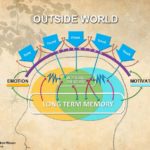When brain researchers answer our questions, that feels like helpful advice.
However, when they give us unsolicited advice, that can feel like nagging. After all, teachers and students already have plenty of people telling us what to do.
This truth puts researchers in a bind. If we are doing something foolish, and they know we’re doing something foolish, they (helpfully) want to give us a warning.
But, if we haven’t asked for that warning, then we’re likely to ignore it. In fact, we might even get angry that we got it.
Research-based Advice for Students: The Problem
This paradox has particular power for researchers who want to advise students.
We’ve got lots of research showing that students use highly inefficient study strategies.
Better said: students use strategies that give them the feeling that they’re making progress right now. Sadly, however, those strategies don’t often result in long-lasting learning.
(This review article by Nick Soderstrom does an excellent job sorting through difference between short-term performance and long-term learning.)
Research-based Advice for Students: A Solution
Three scholars — Miyatsu, Nguyen, and McDaniel — have hit upon a strategy to offer advice without seeming to nag.
Rather than tell students to stop doing what they really want to do, they’ve written an article on using the study strategies students already prefer more effectively.
Other such articles might say: “Stop rereading the text! You’re wasting your time!”
This article prefers an alternate approach: “If you’re going to reread the text, here’s the best way to do it.”
For example: long-time readers of this blog know that rereading the text yields much less learning than retrieval practice.
But: college students LOVE rereading the text. 78% of them use it as a core study strategy.
So, Miyatsu & Co. offer some advice:
Rereading works best for factual material.
Rereading works best when there’s a big gap between the first and second read, AND when there’s a big gap between the second read and the test.
Finally, rereading works best when you use particular strategies to be sure you’re learning from that second read.
See? No nagging!
They also have advice for other key study strategies, including highlighting, outlining, and using flash cards.
Research-based Advice for Students: A Hopeful Prediction
Miyatsu, Nguyen, and McDaniel note that college students rely on study habits formed over years. That is: they …
…appear to hold strong preferences for study techniques that they have used throughout their educational careers; consequently, attempts to sell them on new strategies may be met with resistance.
This note implies that those of us who teach younger students can have a powerful effect by shaping study strategies earlier on.
That is: if we can
inculcate the habit of using retrieval practice;
guide students to choose their study locations well;
help them spread practice out over time;
we can create the (good) study habits that will be hard to break.
In other words: Miyatsu’s article might be immensely helpful right now. However, if we can shape our students’ study habits well, they might not need it when they get to college.




